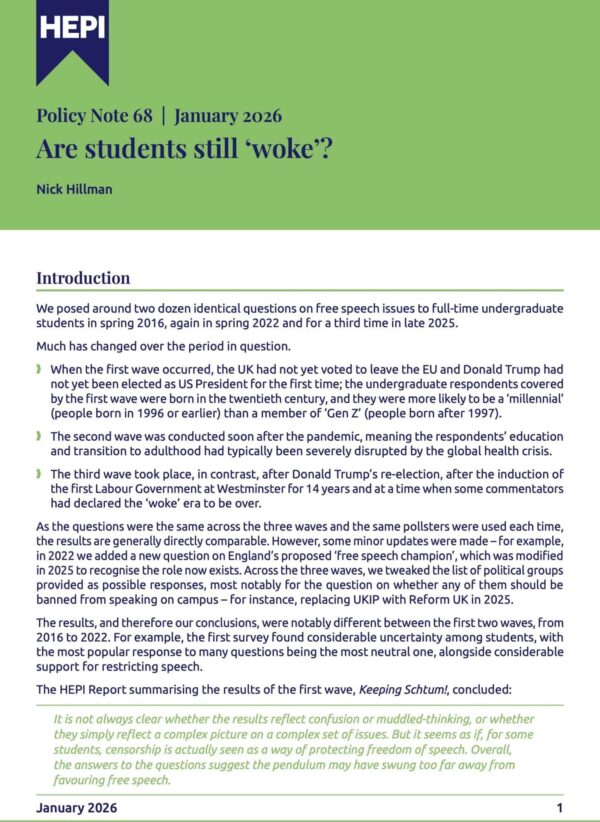Public hugely overestimate graduate regret and underestimate the economic value of universities while being wrong about tuition fees – new study

The public hugely overestimate how many graduates regret going to university and significantly underestimate the importance of higher education to the UK economy, according to a new study into perceptions of the sector which also reveals widespread misunderstandings about tuition fees, student loans and the financial returns from a university education.
The research, by the Policy Institute at King’s College London and the Higher Education Policy Institute (HEPI), reveals the public vastly overestimate graduate dissatisfaction:
- People guess that 40% of graduates wouldn’t go to university if they could choose again, when the actual proportion who say this is only 8%.
- And they guess that 49% of graduates say their university debt has negatively impacted their lives – but in reality, only 16% of graduates feel this way.
At the same time, the public underestimate the economic scale of the higher education sector:
- Few are aware that universities are among the UK’s biggest exporters and employers, and that an institution like the University of Manchester has an income almost equalling that of Manchester United and Manchester City football clubs combined.
- From a list of eight well-known businesses and institutions – including these football clubs – just 6% correctly rank the University of Oxford as top for revenue, despite its income being more than £1bn higher than the second on the list, Greggs bakery chain.
And people are very wrong about what’s happened to tuition fees:
- Just 17% of the public correctly recognise fees have not kept up with inflation since 2012, compared with 58% who wrongly think they have either increased at the same rate or even faster.
Strikingly, it is young graduates who are most likely to show signs of misunderstanding how student loans work:
- 58% of those aged 18 to 34 with a degree incorrectly believe graduates must start repaying these loans as soon as they get anypaid job, compared with 46% of non-graduates of the same age and 35% among the public as a whole.
The research, which is based on a nationally representative survey of 2,082 adults aged 18+ in the UK carried out with Focaldata, examines the public’s understanding and views of UK higher education, revealing significant gaps between perception and reality across key aspects of the sector.
Graduates are far more positive about their experience at university than people think, and feel far less burdened by the debt than many assume
The public hugely overestimate how many graduates regret going to university
- The public guess that 40% of graduates wouldn’t go to university if they could choose again. The actual proportion who say this is only 8%, as measured in a survey carried out last year.
- The public also guess that 49% of graduates say their university debt has negatively impacted their lives. In fact, the 2024 survey found only 16% say this, rising slightly to 22% for graduates who started since 2012, under the current fee system.
The public have a more favourable view of universities than people imagine
- The public guess that five in 10 (49%) people think a university education isn’t worth the time and money it usually takes – but only three in 10 (31%) really hold this view.
- They also guess that only 57% see universities’ research as essential for medical, technological and social innovations, when it’s actually 74%.
The public significantly underestimate higher education’s contribution to the UK economy
Few are aware that some universities generate revenues far greater than those of well-known businesses, including major football clubs
- In 2022/23, the University of Manchester had an income of £1.3bn, which was close to equalling that of both Manchester United FC (£649m) and Manchester City FC (£718m) combined. But when asked to select which has the highest revenue, the university ranks bottom while Man Utd ranks top.
- Only 6% correctly identify that the University of Oxford had the highest revenue in 2022/23, despite its income of £2.9bn being more than £1bn higher than the second on the list, Greggs bakery chain.
People rank higher education as the smallest exporter out of five key sectors, when it is in fact the biggest
- When asked to guess which of five sectors contributed least in exports in 2023, one in four (23%) people say higher education – the top answer given, above sectors such as aircraft manufacturing (14%) and telecommunication services (12%). But higher education brings in a greater amount of money in exports than both these sectors put together: £24.6bn in 2023, compared with £11.8bn and £8.8bn respectively.
The public underestimate just how many people work in higher education
- The public correctly recognise the NHS as the biggest employer from a list of eight UK organisations and sectors, with 62% ranking it top and Tesco coming second, selected by 11% of people. The higher education sector comes third, chosen by 4%. However, in reality the sector employs 510,000 people – more than Tesco (330,00) and its competitor Sainsbury’s (148,000) combined.
People misunderstand student fees, loans and financial returns from university. Strikingly, young graduates are more wrong than the wider public on some key facts
The public are very wrong about what’s happened to student fees
- The tuition fee cap is today worth around 30% less than it was in 2012 – but only 17% of the public correctly recognise fees have not kept up with inflation, compared with 58% who wrongly think fees have either increased at the same rate or even faster.
- Although people know English students take on a lot of debt, they underestimate the true level by £10,000, with their median guess being £43,000 for fees and living costs overall, when the reality is £53,000.
- When asked to rank five countries – the US, England, Canada, Australia and Germany – from highest to lowest average tuition fee debt, 40% of people choose the US and virtually the same proportion (38%) choose England – the top answers given. But in reality, the majority of bachelor’s students graduating in 2023 in England had tuition debt of £27,750 – nearly £6,000 more than the equivalent figure in the US (£22,000 or $29,300), even if the terms of borrowing are typically far harsher in the US.
Many misunderstand how student debt works, particularly young graduates themselves
- 81% of people correctly say it’s true that graduates only start paying back their student loan once they earn above a certain amount. But when we asked about this in a different way, fewer get it right: only 55% correctly it’s “false” that graduates must start paying back their student loan as soon as they get any paid job, suggesting there is still some confusion about how the system works.
- And it is graduates aged 18 to 34 who are most likely to show signs of misunderstanding: 58% of this group incorrectly say it’s true that graduates must start repaying student loans as soon as they get any paid job, compared with 46% of non-graduates the same age and 35% among the public overall.
However, when young graduates are asked whether people only start paying back their student loan once they earn above a certain amount, far fewer – just 20% – incorrectly say that’s false – though young graduates are still twice as likely to be wrong on this question than the public as a whole (9%). - Young graduates (50%) are also nearly twice as likely as the public overall (27%) to wrongly believe missing payments can lead to repossessions by the Student Loans Company.
A significant minority wrongly think graduates will earn the same or even less than non-graduates
- More than a quarter of the public think graduates will earn about the same (21%) or even less (7%) than non-graduates over their lifetimes – despite their being forecast to earn hundreds of thousands of pounds more, according to analysis by the Institute for Fiscal Studies.
Most are aware that higher fees paid by overseas students boost university finances – but the amount of income these students generate is even greater than people think
Most people recognise that international students financially support UK universities …
- 72% of the public correctly say that the higher fees UK universities receive from overseas students help support the finances of UK universities.
… but they underestimate the proportion of tuition fee income that comes from overseas students
- These students generate around 45% of UK higher education providers’ tuition fee income. But the public somewhat underestimate this, with their median guess being 32%.
People guess that more international students remain in the UK than leave after their studies – but in fact it’s the opposite
- 35% of international students leave the UK three years after arriving – the most common outcome, closely followed by the 34% who are still studying on their course. 18% of the public guess each of these outcomes is most likely. A far greater share (30%) believe international students most commonly remain in the UK for work – which is actually the third most likely outcome.
- Notably, 13% of the public hugely overestimate the proportion of international students who stay in the UK to seek asylum, believing it is the most common outcome when in fact it applies to just 0.5% of students.
Professor Bobby Duffy, Director of the Policy Institute at King’s College London, said:
“These surveys of misperceptions are not meant to be general knowledge quizzes – we don’t expect the public to have a detailed understanding of the university sector; they have many more directly important things to focus on.
“Instead what they do is send signals about how we really feel about an issue, which will be based on what we hear from the media, social media, politicians and our general conversations with friends and family.
“And the standout finding for me is the huge overestimation of the sense of regret about going to university among graduates: only 8% of graduates say they wouldn’t go if they could choose again, but the average public guess is 40%.
“This will be driven by vivid, individual stories of graduate regret and the generally negative background noise about the declining value of a degree. It has parallels with misperceptions of immigration, which we also measure in the study, where people hugely overestimate the proportion of immigrants who are asylum seekers and the proportion of overseas students who claim asylum once they are here, because of the vivid stories of boat crossings that dominate headlines.
“It also illustrates the challenge of shifting these misperceptions and getting this more positive message across – it’s extremely difficult to first get pubic attention, and then cut through the noise of individual negative stories that are much more likely to stick in our minds.
“But the sector needs to take these findings to bolster its own confidence and developing concerted communications of the reality, which is more positive than so many think.”
Nick Hillman, Director of the Higher Education Policy Institute, said:
“People who work in higher education often complain that the role UK universities play is misunderstood. But these results reveal for the first time just how poor an understanding many members of the public have about higher education institutions today.
“Universities are bigger in terms of income and employment and more successful in terms of student outcomes than the public often recognise. However, it would be absurd to blame the voters for this major misunderstanding.
“Those of us who work in the higher education sector have not done a good enough job of telling people the true role of universities in modern Britain. We should start correcting that record by inviting more people onto more campuses more often.”
Notes to editors
Read the full report at UK higher education: public perceptions vs reality
Fieldwork for this report was conducted via Focaldata’s in-house platform, with API integration to an online panel network. We surveyed a nationally representative sample of 2,082 adults aged 18+ across the UK, with data weighted by age, gender, region, ethnicity and education status. Fieldwork took place between 25 and 30 June 2025.








Comments
Ron Barnett says:
Hugely important data on perceptions, both among the public and among the student/graduate body.
I hear too many radio programmes about higher education, many of a call-in variety, that are utterly ignorant of the way matters stand and trade on that ignorance.
As Nick Hillman indicates, the sector itself has a long way to go in combatting these levels of ignorance. And it has to be a continuous drive, engaging not just with the government but directly with the media.
Ron Barnett
Reply
Paul Wiltshire says:
Dear oh dear.
This is absolutely not an impartial survey. It has clearly been designed to give exactly the results that the authors want. And then it can be put out into the world as ‘credible’ research to keep driving up the numbers who attend HE which are the authors aim.
It is commercial advertising dressed up as research
Reply
kamir bouchareb st says:
thank you
Reply
Joseph Dunne-Howrie says:
I think a major problem we have to confront in terms of public perceptions of HE is the rise of what Alan Finlayson calls the ‘ideological entreuprenuer.’ Matt Goodwin, Jordan Peterson and the like are an outgrowth of the think tank scholar class, who all present as researchers, but are in fact lobbyists and political activists, all with a very rightwing agenda. Their allies in media ensure their reactionary views reach a much wider audience than those of us who actually work in HE can hope to achieve. I recently came across the phrase ‘discourse surfers’, which is a brilliant encapsulation of how these people move across platforms, amplifying ignorance, but are never required to produce actual evidence for their claims. Education ministers, VCs and university leaders need to be out there, every day, defending our students and staff by countering thes grotesque levels of misinformation in political discourse.
Reply
Dr masi noor says:
This research is revealing, shocking and urgent. It powerfully shows the impact of the media and politicians rather unethically magnifying sentiments that are not supported at all by reality. It also shows the disastrous consequences of the national UCU union failing to challenge media and politicians and address these public misperceptions.
Reply
Tom Cannon says:
Interesting and useful research and useful analysis which I suspect is more interesting for those of us in the sector than the casual reader. Individual Universities have undertaken similar studies to highlight their value to their communities but surprised there haven’t been more collaborative studies involving Universities in a City or City-Region such for Liverpool or the City Region – the University of Liverpool, Liverpool John Moores, Liverpool Hope and complimentary institutions like the School of Tropical Medicine and the Liverpool Institute for the Performing Arts. Focussing on locations could generate public interest than on specific institutions.
Reply
kamir bouchareb st says:
thank you for the lastinformation
Reply
Add comment